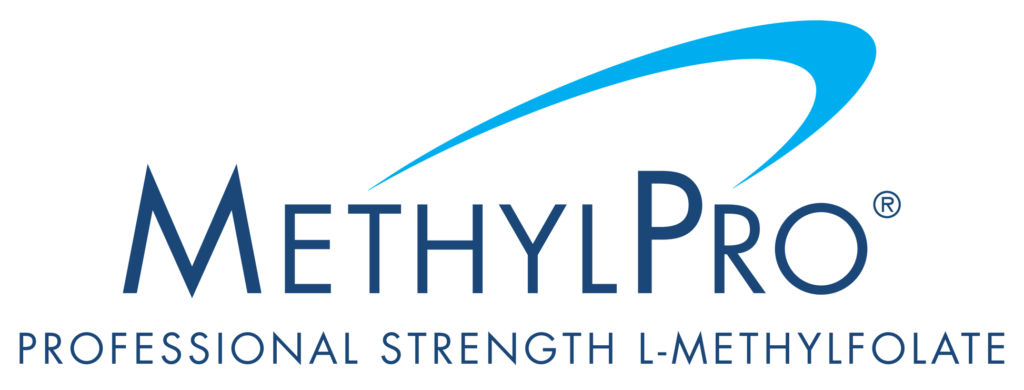One Gene Can Affect Fertility, Conception, Pregnancy, and Postpartum Health
The MTHFR mutation is a genetic variation that can significantly influence how the body processes folate and homocysteine, both critical for reproductive health. While this mutation is highly common, its implications during fertility, conception, pregnancy, and even postpartum can be profound for both mother and baby [1-5]. Understanding the relationship between MTHFR mutation and pregnancy is a proactive measure towards the healthiest outcomes for the whole family.
Last month, we discussed the role of L-methylfolate during pregnancy (regardless of your genetics). You can read that article here. This month, we are delving into the most important information for those who have confirmed that they carry a mutation in the MTHFR gene.
What Is the MTHFR Mutation?
MTHFR stands for methylenetetrahydrofolate reductase, an enzyme that helps convert folic acid into its active form, L-methylfolate. This active form of folate is crucial for DNA synthesis, cell repair, and detoxification processes. However, individuals with an MTHFR mutation likely have some degree of reduced enzyme activity, leading to less efficient folate metabolism and higher homocysteine levels.
Two common variants of the MTHFR mutation, C677T and A1298C, can affect individuals differently [2]. The prevalence of carrying 1 copy of the C677T variant is approximately 20–25% in the general population and typically reduces the activity of the MTHFR enzyme by 30%, while the homozygous carriers (2 copies) can cause a 70% reduction in enzyme activity [2]. If you are a homozygous carrier of the A1298C variant, you are likely to experience about a 40% reduction in enzyme activity [2].
Women trying to conceive or who are pregnant should be aware of their MTHFR status, as it can impact fertility and pregnancy outcomes.
MTHFR Mutation and Fertility
Folate plays a central role in egg quality, ovulation, and the early stages of conception [2]. In women with the MTHFR mutation, impaired folate metabolism may lead to suboptimal egg development and a higher risk of pregnancy loss [2]. Elevated homocysteine levels, a common consequence of this mutation, can also negatively impact fertility through imbalanced inflammation, preventing quality egg maturation, and by reducing blood flow to reproductive organs [3,4].
For men, the MTHFR mutation can influence sperm quality, making it another important factor for couples facing fertility challenges [1].
How to Address It:
- Both/any potential parents with MTHFR variants can supplement with L-methylfolate, the bioavailable form of folate. L-Methylfolate is not dependent on the MTHFR enzyme and is active throughout the body immediately upon absorption.
- Ensure adequate intake of other fertility-supporting nutrients like vitamin B12 and magnesium.
- Target homocysteine balance through dietary and lifestyle changes.
MTHFR Mutation and Conception
Upon conception, folate is critical for healthy neural tube development in the embryo [5]. Women with an MTHFR mutation may struggle to maintain sufficient levels of active folate, even if taking prenatal supplements with folic acid [6].
Additionally, high homocysteine levels can create blood clotting issues, potentially affecting the implantation process [4].
How to Address It:
- Get tested for homocysteine levels and MTHFR mutations before conception.
- Work with a healthcare provider to ensure optimal folate supplementation.
MTHFR Mutation and Pregnancy
Pregnancy places additional demands on a mother’s folate metabolism, making the MTHFR mutation a more significant concern. Healthy folate levels during pregnancy support:
- Healthy neural tube development in the baby [5].
- Normal maternal blood pressure [7].
- Normal placental growth, function, and blood flow [8].
Beyond folate metabolism, elevated homocysteine can also pose risks during pregnancy. High levels can be associated with pregnancy loss, placental abruption, and early birth [4].
How to Address It:
- Switch from synthetic folic acid to L-methylfolate, which bypasses the need for MTHFR enzyme conversion.
- Ensure you are taking a full-spectrum, well-rounded prenatal vitamin containing bioavailable, active forms of B vitamins, including B12 and B6.
- Focus on an inflammation-balancing diet rich in leafy greens, legumes, and whole grains.
MTHFR Mutation and Postpartum Health
After delivery, folate remains crucial for recovery and breastfeeding. Mothers with an MTHFR mutation may face challenges in maintaining energy, emotional well-being, and milk supply if functional folate levels are low [9,10]. Postpartum blues and more serious issues with mental wellness have also been linked to elevated homocysteine levels, highlighting the importance of continued care [11].
For babies, maintaining sufficient folate during pregnancy can positively influence long-term cognitive and developmental outcomes.
Supplementation with synthetic folic acid can significantly change the nutritional profile of breastmilk, raising the levels of unmetabolized folic acid (UMFA) up to 14-fold [9]. The consequences of consuming this high level of UMFA are still under investigation [9].
How to Address It:
- Monitor for symptoms of nutrient insufficiencies in both mother and baby.
- Consult a healthcare professional to develop a postpartum nutrition plan, including a specific dose of L-methylfolate curated to your individual needs, especially while breastfeeding.
Proactive Steps for Mothers with MTHFR Mutations
While the MTHFR mutation may add complexity to your reproductive journey, it’s manageable with the right knowledge and tools. Here are actionable steps:
- Get Tested: If you suspect you have an MTHFR mutation, a simple genetic test can confirm it.
- Take the Right Supplements: Talk to your doctor about switching to a prenatal or multivitamin containing L-methylfolate and other methylated B vitamins. MethylPro offers L-methylfolate as a standalone vitamin, in a variety of supplement formulas (including a multivitamin), and in a range of dosing options. Find the right one to balance your body chemistry and diet.
- Monitor Homocysteine Levels: Regular blood tests can help ensure they stay within a healthy range.
- Consult a Specialist: Work with a healthcare provider familiar with MTHFR-related concerns to develop a personalized care plan.
MethylPro®: Support for MTHFR Mutation and Pregnancy
MethylPro® offers a range of high-quality supplements that can support individuals with MTHFR mutations. Our methylated B-complex vitamins and L-methylfolate supplements ensure you (and your baby) get the nutrients needed for optimal health throughout your reproductive journey.
Explore our website for products tailored to support healthy folate metabolism and balance homocysteine levels.
Taking care of your health before, during, and after pregnancy can profoundly impact your baby’s future. With the right steps, the challenges of the MTHFR mutation can be overcome.
References
- https://link.springer.com/article/10.1007/s10815-021-02200-6
- https://www.sciencedirect.com/science/article/abs/pii/S221295882100046X
- https://www.tandfonline.com/doi/abs/10.1080/01443615.2020.1785409
- https://onlinelibrary.wiley.com/doi/full/10.1155/2021/6652231
- https://www.sciencedirect.com/science/article/abs/pii/S0890623824000431
- https://www.sciencedirect.com/science/article/abs/pii/S0301211520303754
- https://www.sciencedirect.com/science/article/abs/pii/S277304412300058X
- https://www.sciencedirect.com/science/article/abs/pii/S0301211520307272
- https://www.nature.com/articles/s41598-023-38224-4
- https://journals.plos.org/plosone/article?id=10.1371/journal.pone.0243936
- https://www.frontiersin.org/journals/nutrition/articles/10.3389/fnut.2022.923569/full

